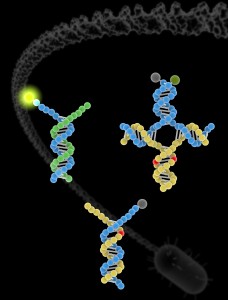 Georg Seelig – UW professor of CSE and EE – working with David Zhang of Rice University and Sherry Chen, a UW EE doctoral student, this week unveiled a groundbreaking new method for detecting minute changes known as single nucleotide polymorphisms (SNPs) in the human genome. The human genome has more than 6 billion base pairs, and one of the revelations of modern genomics is that even the slightest change in the sequence – a single-nucleotide difference – can have profound effects.
Georg Seelig – UW professor of CSE and EE – working with David Zhang of Rice University and Sherry Chen, a UW EE doctoral student, this week unveiled a groundbreaking new method for detecting minute changes known as single nucleotide polymorphisms (SNPs) in the human genome. The human genome has more than 6 billion base pairs, and one of the revelations of modern genomics is that even the slightest change in the sequence – a single-nucleotide difference – can have profound effects.
The new SNP genotyping technique, dubbed “double-stranded toehold exchange,” is described in a new paper in Nature Chemistry. The method is markedly different – in both form and performance – from any of the dozen-plus methods already used to detect SNPs.
“There are two axes of performance in SNP detection – read length and specificity,” said Zhang. “We’re at least an order of magnitude better on each axis. In fact, in terms of specificity, our theoretical work suggests that we can do quadratically better, meaning that whatever the best level of specificity is with a single-stranded method, our best will be that number squared.”
Read more here: UW News, Health News, Science Daily, nanowerk.

